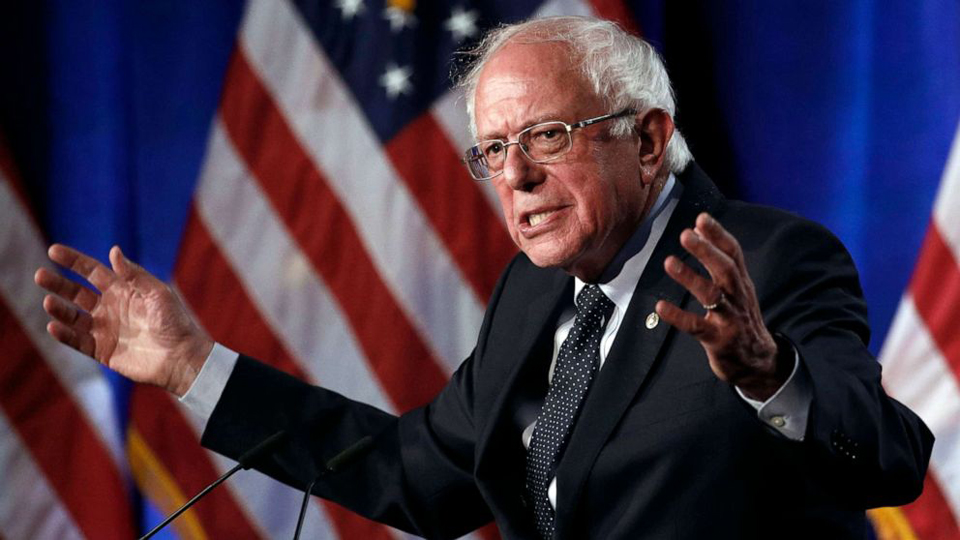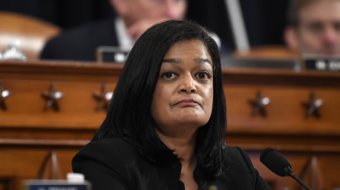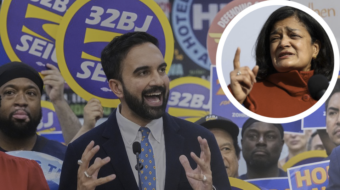
In the lead-up to the statewide Democratic primary caucus on Saturday, Feb. 22, Nevada’s early voters on Feb. 15, the first day, turned out in record numbers—more than 18,500 Democrats, almost twice the turnout on the first day of advance caucusing in 2016.
Enthusiasm over this election is mounting, and the eyes of the nation are on this small Western state which will allocate only 36 delegates to the Democratic National Convention. They will be divided among only the top tier of candidates meeting the viability threshold.
After two impressive showings in Iowa and New Hampshire, Bernie Sanders, the self-declared democratic socialist, has been elevated by voters to the perch of front-runner in this election. In Nevada, current RCP polling averages show the Vermont senator leading the pack with a 14-point spread over Joe Biden, followed by Elizabeth Warren and Pete Buttigieg.
As of Feb. 18, the averaged analysis by FiveThirtyEight had Sanders at 26.6%, Biden at 14.9%, Buttigieg at 11.6%, Warren at 11.4%, followed by hedge-fund billionaire Tom Steyer at 10.5%, and the newcomer to the race, former New York City Mayor Michael (Mike) Bloomberg at 9.1%. Sen. Amy Klobuchar and Rep. Tulsi Gabbard trail as the last two of the eight primary candidates remaining in the race. Some polls have Sanders at over the threshold of 30%.
The grass-roots Latinx and Chicanx organization Mijente has made a historic, first-ever presidential endorsement of Sanders, helping to push him ahead of other candidates who would have divided the progressives vote. The Latinx vote in Nevada, as in Arizona, Georgia, Texas, California, New Mexico, and other states, is key to a winning Democratic constituency.
Only in the last days before the candidates’ debate Wednesday night (Feb. 19) did Bloomberg qualify for inclusion, based solely on the hundreds of millions of dollars of his personal wealth that he spent to flood the internet and the airwaves on advertising. In short, he bought his way onto the debate stage. The Democratic National Committee, which sets the rules for participation in the primary race based on showing in the polls, has welcomed him in as a serious contender.
After the DNC’s moves in 2016 to prejudice Bernie Sanders’s campaign in favor of Hillary Clinton, this year again appears to many voters and activists as yet another attempt to deny Sanders the top spot in the race to defeat Donald Trump in November.
Mike Bloomberg is considered the 9th richest person in the United States. He has already spent nearly half a billion dollars on this campaign.
Let’s face it: Both the Republican and the Democratic parties are capitalist parties. No one will dispute that. What is emerging now, more patently than ever, is the extent to which the Democratic establishment will go to prevent a Sanders candidacy. “Stop this man at any cost!” America’s 1% is telling the titans of capital.
Middle-of-the roaders in the primary campaign are faltering, and have not captured the imaginations of working-class voters and people of color. In the face of masses of working Americans, students and young people, women, African Americans, and Latinx, turning toward the one candidate in the race with consistent, systemic answers to the nation’s problems, the sudden appearance of Bloomberg is cynically saying to the country that irrespective of his past experience and extremely problematic politics—just for starters, he endorsed George W. Bush at the Republican National Convention!—only such a man of enormous personal financial resources can go up against Donald Trump and win.
The idea of building a mass movement to do that is one they never even consider despite the fact that, without such a movement, Trump will never be defeated.
In a piece of deliciously targeted satire, The Onion ran a column, “DNC Mulls Asking Donald Trump To Run As Democrat In Effort To Stop Sanders,” pointing to the desperation of America’s ruling classes to keep a socialist far, far, far away from the White House.
The multi-pronged attack on Sanders has been brewing for years and is concentrated on his flagship issue of Medicare for All. Every argument in the book has been thrown against it in a deeply coordinated campaign amongst America’s corporate class to keep healthcare in the hands of profiteers. From medical insurance to ambulances to hospitals to pharmaceuticals, rehabilitation, long-term care, preventive medicine, dialysis, maternity care, home care, sick leave, parental leave, children’s services, school lunches, healthy diets, the environment, etc., etc. In short, there is nothing in this entire cycle that capitalism does not want to retain in private, money-raking hands.
Republicans are the ideological standard-bearers for absolute orthodoxy on this issue. President Trump has reiterated his party’s commitment to doing away with Obamacare, Social Security, Medicare, Medicaid, SNAP (food stamps)—not to mention the trade unions that form the single strongest bulwark in society protecting these programs.
“Moderate” Democrats echo Republican—that is, capitalist—concerns about these landmark achievements of the American people, when they say how “expensive” they are or how “unworkable” they will be, as if U.S. healthcare costs are not already twice the cost of any other country in the world, and with poorer outcomes! No one even talks about the declining life expectancy in America. Some of these Democrats pose as defenders of the working class, citing the “gold-plated” healthcare provisions in a few union contracts that would be “taken away” by Medicare for All. But what percentage of the working class do such “golden” contracts cover? 2%? 3%? Surely, not even 5%. Hell, the great majority of working people aren’t even union members anyway.
Sanders’s vision of Medicare for All, which his voters seem to understand far more clearly than his opponents in the primary, would “gold-plate” the whole country’s healthcare system, bringing it into line with just about every other economically advanced nation in the world.
And if healthcare could be “gold-plated,” then why not education? Why not our infrastructure? Why not our energy sector? Why not a mandatory living wage? Omigod, why not our banks!?
That is why the issue of Medicare for All is so important: It is seen as the door through which a whole lot of other questions about the nature and structure of American society will pass. It also explains why Medicare, and Social Security before it, was always seen as a “socialist” threat to America’s religion of “free enterprise.”
Already a majority of young people in the U.S. poll favorably about socialism, whatever their conception of that may be, and that is why for America’s hysterical 1% and its enabling classes, Sanders must be stopped!
Medicare for All is a stand-in for the whole bundle of issues its passage implies. The American Israel Public Affairs Committee (AIPAC), for example, the fanatically pro-Netanyahu Zionist lobbying organization, has been airing ads in Nevada against Medicare for All, not even needing to mention Sanders by name. Big-donor AIPAC is afraid of a Sanders presidency because he has openly voiced his commitment to bringing the Israel-Palestine question to the table as a precondition to continued aid to Israel.
By way of contrasting himself to the AIPAC version of what it means to be Jewish in America and in the world, Sanders has released a new campaign video in which he says he is “very proud to be Jewish” and that he looks forward to “becoming the first Jewish president in the history of this country.” For AIPAC, even that historic prospect pales before the far more important project of preventing socialism from becoming considered as a viable approach to America’s problems. AIPAC more likely prefers Mike Bloomberg as their choice for first Jewish president.
A Sanders as the nominee of the Democratic Party for president does not mean that every Democrat in the country need declare their allegiance to socialism—although Republicans will surely make that accusation. But it certainly would allow for the opportunity to reconstruct the party toward more genuinely representing the critical economic and social interests of most Americans without catering to the Bloombergs and Steyers. It would help redefine and clarify the kind of party America needs to counter the decades-long record of Republican obstructionism and corruption.
The Feb. 19 debate will undoubtedly focus on these core competing visions of what a post-Trump future in America could be. Will it be enough to defeat Trump and go back to even a fully functioning Obamacare? Or do we need to expand our sights to encompass everything that makes it possible for Americans to enjoy “life, liberty and the pursuit of happiness?” That must include vision, dental, hearing, and mental care.
A persuasive showing for Sanders in Nevada, especially if followed up by equally impressive numbers in South Carolina on Feb. 29, could effectively clinch his nomination. Voters on Super Tuesday, March 3, when a third of the nation goes to the primary polls, will enter the voting booths with ever greater clarity as to what the stakes are in this election. It’s not just Defeat Trump At Any Cost. More than that, it’s what kind of country do we want to live in starting on January 20, 2021?










